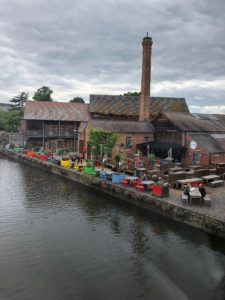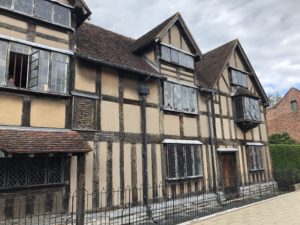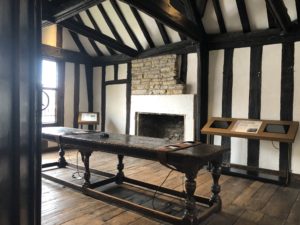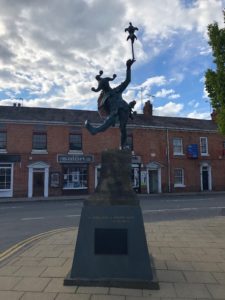Shakespeare: Literature’s Great Mystery

When I wrote Coming Up Murder, I knew I wanted to involve Shakespeare, so I created a Shakespeare Festival on campus. Shakespeare’s First Folio is on tour, and Copper Bluff is one of its lucky stops. Or not so lucky for one presenter. The presenter claims, in a room full of Shakespeare scholars, that Shakespeare is actually Edward de Vere, the Earl of Oxford. Although my graduate degree is in English, I’d never read that theory until I researched Coming Up Murder. Then I read all sorts of things. Oxfordians (yes, they have their own group) have many reasons for believing the Earl penned the plays.
 The Earl was an aristocrat and a praised poet, one whose work draws comparisons to Shakespeare’s. He might have invented and used the pen name Shakespeare (his nickname at court was “spear-shaker”) to distance himself from political criticism. Some researchers claim writing was an unsuitable occupation for aristocrats, which explains the pseudonym, but Oxford himself wrote works under his own name, as did Queen Elizabeth. So the claim itself is problematic. Still, he might have invoked the name to avoid scrutiny.
The Earl was an aristocrat and a praised poet, one whose work draws comparisons to Shakespeare’s. He might have invented and used the pen name Shakespeare (his nickname at court was “spear-shaker”) to distance himself from political criticism. Some researchers claim writing was an unsuitable occupation for aristocrats, which explains the pseudonym, but Oxford himself wrote works under his own name, as did Queen Elizabeth. So the claim itself is problematic. Still, he might have invoked the name to avoid scrutiny.
 Oxford knew well the themes in the plays. Titled men and women had a duty to uphold their titles, regardless of their own desires. Oxfordians insist an aristocrat, well versed in court life and power struggles, must have written the plays. They don’t believe a man with a grammar school education had the personal experience or legal knowledge to pull off such works as The Merchant of Venice. Oxford, on the other hand, studied law at Gray’s Inn. He also died in 1604, however, well before several of the plays were written. This is Shakespeareans’ strongest claim, and the one the victim disputes in Coming Up Murder.
Oxford knew well the themes in the plays. Titled men and women had a duty to uphold their titles, regardless of their own desires. Oxfordians insist an aristocrat, well versed in court life and power struggles, must have written the plays. They don’t believe a man with a grammar school education had the personal experience or legal knowledge to pull off such works as The Merchant of Venice. Oxford, on the other hand, studied law at Gray’s Inn. He also died in 1604, however, well before several of the plays were written. This is Shakespeareans’ strongest claim, and the one the victim disputes in Coming Up Murder.
But problems also arise when analyzing William Shakespeare’s death. His will doesn’t mention the plays—at all. It does give his second-best bed to his wife (lucky her!). Shakespearians claim the second-best bed in the house was a prized position, and his theater friends knew what to do with his work. There was no need to mention it in the will. However, Shakespeare leaves behind no plays or poems, and his handwriting is barely legible. The world would have to wait seven years after his death for the First Folio, printed in 1623.
 When I went to England last summer, I visited William Shakespeare’s house at Stratford upon Avon. Like all good amateur sleuths, I thought the truth would come to me by intuition. The house generates a large amount of revenue each year for the Shakespeare Birthplace Trust, though it’s been reported that some of the house dates to the 1800s, well after Shakespeare’s time. Oxfordians claim big business keeps the myth of Shakespeare going. Enjoying a scone inside Shakespeare’s grammar school while my daughters practiced writing with a quill, I felt the sentiment behind the controversy. But is it true?
When I went to England last summer, I visited William Shakespeare’s house at Stratford upon Avon. Like all good amateur sleuths, I thought the truth would come to me by intuition. The house generates a large amount of revenue each year for the Shakespeare Birthplace Trust, though it’s been reported that some of the house dates to the 1800s, well after Shakespeare’s time. Oxfordians claim big business keeps the myth of Shakespeare going. Enjoying a scone inside Shakespeare’s grammar school while my daughters practiced writing with a quill, I felt the sentiment behind the controversy. But is it true?
In my opinion, it’s one of literature’s great mysteries, and it all began with the question: what if? What if Shakespeare isn’t Shakespeare? The unthinkable, the unguessable, is the heart of a good mystery. I don’t know the answer to the question. But I do know I like asking it.
